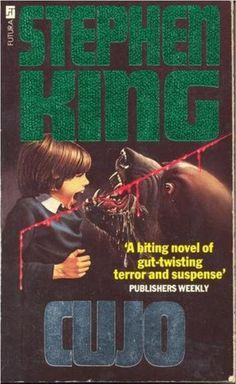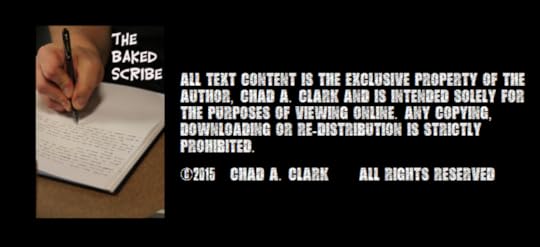Tracing The Trails Of The King : Cujo
FAIR WARNING – if you have not read this book, there will likely be spoilers contained within this piece. This is the eighth essay in my ongoing series on Stephen King, and is intended to be a free discussion of the book. I cannot be held responsible if I inadvertently ruin the ending for you, so if you think this might apply to you, I would encourage you to turn back now.
.
.
There was water in the marsh and he was horribly thirsty, but the actual sight of the water had driven him into a frenzy both times. He wanted to drink the water, kill the water;bathe in the water; piss and shit in the water; cover it over with dirt, savage it; make it bleed
-Stephen King, Cujo
.
So it’s bound to happen, pretty much inevitable. You don’t write seventy some books and expect every single one of them to be out-of-the-park grand slams. Everyone is going to be slightly different in  their preferences, in terms of what books they love and which ones just don’t work for them.
their preferences, in terms of what books they love and which ones just don’t work for them.
Cujo is one that I would have to categorize as a miss, or rather, I think that it could have been so much better than it ended up being.
Throughout his career, King has certainly been open and honest about the role of addiction in his life, and with his problems with substance abuse. And as we start to get into the mid-eighties, his habits were starting to edge towards the worst point in his life so, with that in mind, it is kind of appropriate that he chose to write a story about a monster that can’t be reasoned with, and destroys everything it touches in a mad, blind rage.
I have read that King has no memory of writing this book. He was so over the edge, from the booze and the drugs that he literally lost almost all sense of the book, of any word he wrote, or scene he constructed. And what I’m about to say is going to sound harsh and maybe unsympathetic, but when I read this book, it wasn’t hard for me to imagine that. And please don’t take this as anything more than my honest feelings about this specific book because, while I know that I am probably in a minority on this one, and that this is one of his more popular titles, to me it reads like the author just wasn’t paying that much attention to the craft of the story, or to the narrative.
And to be completely clear, I think that there is an amazing, brilliant story in there. The core of the book, once you get there, is inspired and amazing. The problem is the sheer amount of husk of the narrative that has to be stripped away, before you get down to the essential qualities of it. The book is a very slow starter, although I did appreciate the early references to The Dead Zone. It is slow to start and he seems to devote a great deal of time creating narrative arcs for characters who, in the grand scheme of things, don’t really matter that much to the story as a whole.
Some of that time spent does serve somewhat of a purpose. For example, after our heroes finally find themselves trapped in their car outside the home of their mechanic, we know from what has been happening in his story that while they are hoping to be rescued, no one will likely be showing up any time soon. We have that information which they are lacking so, that does sets up a certain amount of dramatic irony but even that isn’t really necessary, in my opinion. I actually think that the story would be stronger if we spent the entire time with them in the car, wondering if and when anyone will ever show up.
Ultimately, I think that this story would have worked much better as a novella. If I were to do an edit on this story, I would probably strip away most of the story that isn’t directly related to the mother, trying to protect her son from the roving beast outside of their car. If this was shorter, more efficient and focused, I think it would be one of the greatest books in his catalog. Instead, what we are left with is a book that, while I didn’t hate it, certainly is not as good as other offerings from this time period.
There are several aspects to this story that I think redeem this story to some extent, and make up at least somewhat for it’s shortcomings. First, he puts the reader into the mind of the dog, and tells some of the story from his perspective. This itself is no easy task to accomplish, as the challenge becomes how to portray the simplistic imaginings of the animal, but still in a way of moving the narrative forward. His additional challenge here, is that we are dealing with a mind that is largely deteriorating from the effects of rabies. Seeing the fraying of this dog’s sanity is chilling and tragic to behold.
Also relating to the dog, I love how he has managed to create a monster that is somehow terrifying and awful and yet, at the same time, completely sympathetic. It isn’t Cujo’s fault that he happened to chase a rabbit into the opening of a cave and gets stuck. It isn’t his fault that he manages to get bitten by an infected bat and it certainly isn’t his fault that he wasn’t properly vaccinated against such a deadly disease. Rabies robs him of any sense and reason so, you have on one hand a monster that you can’t help but feel sorry for. But at the same time, he is a monster that can’t be talked down or won over. He only does one thing now. He kills and does so without forethought, or caring of the consequences. He just kills.
I also loved the ending of the book. I won’t go into too many details, other than to say that the tragedy of it was about as shocking as I have gotten from a book and I really appreciated that King resisted the urge to go for the stereotypical Hollywood style ending. The ending he wrote took a lot of guts and confidence in what he was doing, and I have nothing but respect for him doing it the way he did.
So if I were to grade this book, I would probably give it a solid C+. Probably a three star rating. I enjoyed it, and once I got to the real meat of the book, I couldn’t put it down. I just think it needed to be much shorter, and maybe included as one of his collections of longer short stories, the likes of Different Seasons or Four Past Midnight. I’m sure that there will be many who disagree with me, although part of me wonders if those who are rabid (forgive the pun) fans of this book are more fans because of the movie, than anything else. Regardless, everyone is entitled to their own lists of titles that they love and those they don’t care for as much. For me, this one didn’t work as well but, as I said at the start, you don’t write as many books as he has without having a few that disappoint more than others. There were more than a few amazing books that came before this and even more that were yet to come.
I think that this book represents somewhat of a transitional period for King. Starting with Carrie and moving up through Firestarter, there seemed to be a lot of emphasis on characters possessing some kind of psycho-kinetic or supernatural abilities, whether it be to start fires or to physically move objects or see the future. I see Cujo as the first step into the next phase, if you will. It seems that many of the books that follow this focus on a character on a quest. Whether it be a boy trying to save his mother’s life, in The Talisman, or that of a Gunslinger, following the Man In Black across the desert. You can see a quest of sorts in the journey of a recovering alcoholic poet, who ends up being the last man standing in the midst of an alien invasion or the loser’s club, trying to stave off the ultimate evil. There are also books of great dark, supernatural content such as Pet Sematary or Christine.
My point is that as this door closes, it opens to so many more books, classics of modern literature, that we have been fortunate to have been gifted with. I will see the rest of you along the way, as we visit each one of them.
My name is Chad Clark, and I am proud to be a Constant Reader.
.
.
.
.

[image error]





